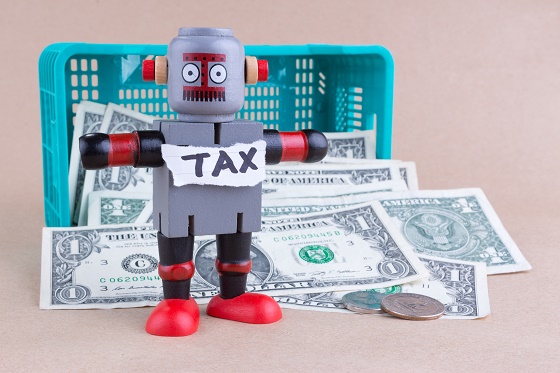
Automation benefits workers in many ways. Jobs are safer because of automation, the environment we live in benefits from automation, and consumer goods are more affordable, too.
But automation also benefits management, and there are those who worry that workers aren’t getting the goodies company leaders are getting. In this scenario, the owners of the robots get the benefits of increasing productivity and lower labor costs, concentrating wealth in fewer people. Workers may lose jobs, get pushed into the less-lucrative service economy, or just stay where they are while their bosses gain.
One solution to this could be taxing robots.
Changing behavior
One reason suggested for taxing robots in factories is to disincentivize automation. Factory owners who want to replace human workers with machinery do so to cut costs. If taxes make it just as expensive to hire robots as to hire humans, the thinking goes, bosses will have less reason to invest in automation.
Right now, there are tax advantages for automating and tax disadvantages for hiring people.
If taxes can make robots less financially appealing, they could slow down innovation in US manufacturing. The US could find it even harder to compete with European and Asian manufacturers. Prices of consumer goods could rise and wages could stagnate. The overall results might not be great for American workers.
Replacing revenue
A factory that used to employ 250 low-skilled workers might now have robots and eight high-skilled human workers. The government in this case loses a lot of payroll taxes and income taxes. Where can it make up the shortfall? Perhaps those robots — or rather, the owners of those robots — should be picking up the slack.
Under this theory, robots have to be taxed to make sure they bring in the same amount of tax revenue as the human workers they replace. This new funding source could be directed toward a stronger safety net for people losing jobs to automation, retraining programs, or other benefits for displaced workers.
New York Mayor and presidential candidate Bill de Blasio outlined a plan like this for Wired Magazine. His plan would require employers who let a worker got because of automation to stump up five years’ worth of payroll taxes. An upfront expense like that would almost certainly discourage automation. But the funds collected under this proposal would go directly to create labor-intensive jobs in construction, healthcare, and other industries facing shortages of human workers.
Who will benefit?
Those who argue against taxing robots question whether either of these pro-tax advantages would really benefit workers. Robots can now shovel snow. Would any human worker really prefer to shovel snow — against the wishes of his or her employer — rather than letting a robot do it? Are we ready to give up automatic dishwashers, sewing machines, ploughs, or power tools, let alone industrial automation?
Another presidential candidate, Andrew Yang, wants to create a Value Added Tax for companies benefiting from automation. This is a tax that applies not to income or sales but to changes in products. When wool is made into yarn, the millers are taxed on the value they’ve added to the raw materials. VAT systems are widely used in Europe, but rare in the U.S. Yang would use the extra revenue to fund a universal basic income program which he claims would bring money into local economies.
The idea of taxing robots is being hotly debated. Who knows how it will turn out? We don’t. We do know all about Rexroth electric industrial automation. Call us when you need support or service for your drive and control systems.
